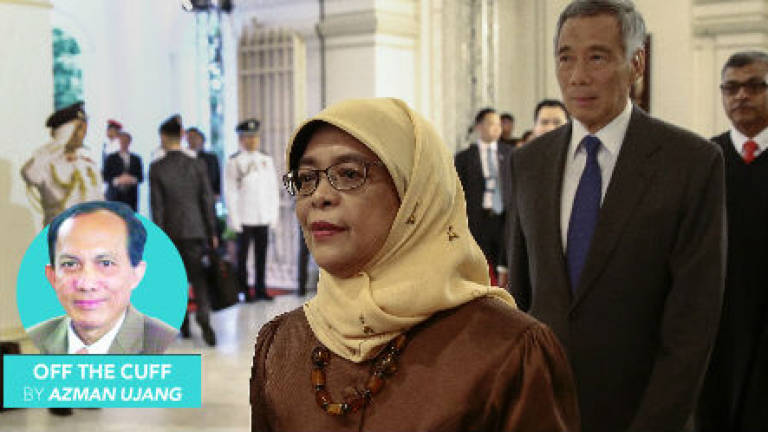Anti-climax in Singapore

ALL eyes turned to Singapore this week where history was made when former speaker of Parliament Halimah Yacob became the republic's first female president.
She was sworn in to the highest office in the land, but a largely ceremonial one, yesterday after what can only be described as an anti-climax to months of excitement among Singaporeans especially their minority Malay community.
It had all the makings of a political drama because Singapore has not had a Malay as president for some 47 years since Yusof Ishak, the first president, who held office in 1965 following Singapore's separation from Malaysia till he died in 1970.
Yusof, born in Perak, was a prominent journalist, who founded Utusan Melayu. He still casts a shadow over Singaporeans as his image adorns the nation's banknotes.
An anti-climax because Halimah, 63, had won without a contest although this was the first time that the presidential election had been reserved exclusively for Malay candidates.
Two days before nominations closed on Wednesday, Halimah, who resigned as speaker to run for president, was declared the only eligible candidate after two other potential rivals – both from the private sector – fell short of the strict qualification criteria.
The Presidential Elections Committee rejected the applications for the certificate of eligibility from Farid Khan, 62, the chairman of marine services provider Bourbon Offshore Asia Pacific and Mohamed Salleh Marican, 67, chief executive of Second Chance Properties.
The reason being, their companies fell far short of the S$500 million (RM1.55 billion) shareholder equity as spelt out in the Constitution.
Candidates from the public sector are eligible if they are either a minister or former minister, chief justice or speaker.
Last November, Parliament passed a constitutional amendment to the elected presidency law that allows for an election to be reserved for members of a minority group.
The rationale for this was explained to me by Prime Minister Lee Hsien Loong when I interviewed him shortly after the amendment was passed.
"We decided to put it in the Constitution that if after five terms we don't have a president from a particular minority community, that means either Malay or Indian president, then the next term the election is reserved for candidates from that community.
"We worry that over the long-term if we don't have a system to ensure a minority becomes a president from time to time, then it's going to be difficult and we will have a long period that we don't have a minority as president," the prime minister told me.
Reactions from the usually subdued Singaporeans when it comes to political issues were this time uncharacteristically blunt and it's obvious that by and large they were disappointed at not having the chance to elect candidates of their choice.
Most of the critical comments came from think-tank fellows and netizens who took to social media to vent their frustrations and even anger.
A Malay MP, Zaqy Mohamad, said: "On the one hand, I am very happy for Halimah as she would make a very good president. But many Singaporeans were hoping for a contest because they felt they had a democratic right to vote."
Yusof Ishak Institute fellow Norshahril Saat said electoral contests would give winners an element of legitimacy and voters the chance to know candidates better through their campaigns.
Institute of Policy Studies senior research fellow Mathew Mathews said without a contest, some would question Halimah's legitimacy as president, particularly those who believe others could have qualified in a less restrictive race.
Law lecturer Eugene Tan from Singapore Management University agreed with Mathews, saying "Halimah will have to bear the burden of doubts about her legitimacy. It is unfair, but these perceptions are there."
I particularly like this comment from one netizen on the S$500 million issue that disqualified the other two hopefuls: "To qualify for the best swimmer, candidates from the private sector are asked to swim across an adult pool with sharks in it, whereas (those) from the public sector are to wade through a baby pool, with the PM and ministers holding umbrellas for them!"
To me, the most poignant comment came from journalist Safhras Khan, who was highly critical of the requirement for private sector candidates to have such a massive amount in shareholder equity.
He said this immediately disqualifies most Singaporeans, regardless of race.
He wrote this in July on Yahoo News but sadly, Safhras died of a heart attack a week ago. And he was only 39.
He lamented over the dearth of Malay candidates although the community has made tremendous progress since independence in 1965. There are more Malays now holding important roles in the Singapore Armed Forces as well as successful businessmen and scientists.
The number of Malay graduates has been increasing and there are now two full ministers in the Cabinet heading important ministries.
I have been a keen observer of Singapore affairs since my school days and frankly I had expected Malay personalities who have served as ministers to join the race, including former speaker and minister Abdullah Tarmugi.
I met up over tea with Masagos Zulkifli, the Singapore minister for environment and water resources, who was in Kuala Lumpur for on Tuesday, anxious to hear from him why these politicians aren't contesting.
"Singapore politicians are different. There is a lack of interest in public service. Even in my own case, I was offered three times to join politics before I agreed," said Masagos, who is an engineer by training.
Some Singaporeans say there are Malays out there who can do the job as president but they are unwilling to do so for some reasons, including privacy while others are contented with their jobs.
On behalf of theSun, congratulations to President Halimah.
And also as chairman of Bernama, the only Malaysian media organisation with a presence in Singapore since 1980, I wish her all the best as head of one of the world's wealthiest and most stable nations.
Comments: letters@thesundaily.com